FILE - In this Saturday, Sept. 26, 2015 file photo, Pope Francis waves from inside his car after arriving at Philadelphia International Airport in Philadelphia. Pope Francis follows his predecessors next week Nov. 25-30, 2015 to visit Africa whose growing numbers of Catholics are seen as a bulwark for a church seeking to broaden its appeal amid secularism, competing Christian faiths and violent extremism, in a trip that will take him to Kenya, Uganda and the Central African Republic. (AP Photo/Susan Walsh, File)
The Associated Press
JOHANNESBURG (AP) - Pope Paul VI became the first modern pope to visit Africa in 1969 and declared the continent a "new homeland" for Jesus Christ. During the quarter century of his papacy, St. John Paul II traveled to 42 African countries and earned the nickname "the African." Pope Benedict XVI said Africa was a continent of hope. Next week, Pope Francis joins his predecessors and visits a region whose growing numbers of Catholics are seen as a bulwark for a church seeking to broaden its appeal in the face of challenges from secularism, competing Christian faiths and violent extremism.
The latter threat, which struck Paris on Nov. 13 with attacks claimed by the Islamic State group and then Mali on Friday, will be a key theme of the pope's Nov. 25-30 trip to Kenya, Uganda and the Central African Republic - and a potential security risk for the pope himself.
Each of the three countries have their own narratives of ethnic and sectarian division. In Kenya, the first stop on his tour, Francis is expected to offer a word of encouragement to Christians still reeling from an April attack by the Islamic militant group al-Shabab that killed nearly 150 people at a Kenyan college of mostly Christian students.
He will reach out to "people who are afraid, who have been terrorized, who have been subjected to a lot of security checkpoints and all that," said Rev. Stephen Okello, a Kenyan Catholic priest who also recalled unrelated ethnic violence following elections in 2007 that killed more than 1,000 people in Kenya.
"Kenyans really need that reconciliation," said Okello, an organizer of the papal visit. Given other regional violence, "this might be a message that is good for the whole of Africa," he said.
Indeed, Islamic extremists stormed the Radisson Blu hotel in Mali on Friday and killed at least 20 people. Boko Haram, an Islamic extremist group, has waged an insurgency in Nigeria for years. And of more immediate concern to the Vatican, violence between Muslims and Christians in the Central African Republic has raised concerns about security on Francis' trip itself.
The challenge for the pope, who has described the violence flaring in Paris and elsewhere as part of a piecemeal "third world war," will be to appeal for people to "rise above their humanity" by resisting the temptation to harden their attitudes, said Jo-Renee Formicola, a papal expert and political science professor at Seton Hall University in the United States.
"How do you reconcile mercy and war?" Formicola said.
Aside from the conflicts plaguing the continent, Francis is also expected to touch on themes close to his heart that are also of enormous concern to Africa: poverty and the environment, as well as the need for dialogue between Christians and Muslims.
Despite the challenges, Africa is a place of promise for the Catholic Church, which has withered in Europe and the Americas because of increasing secularism and competing evangelical and Protestant churches.
The proportion of African Catholics in the world population of Catholics increased from 7 percent to 16 percent between 1980 and 2012, according to a report this year by the Center for Applied Research in the Apostolate, a research center affiliated with Georgetown University in the United States. Population growth and growing life expectancy will more than double the number of Catholics to 460.4 million in 2040, it said.
In 2012, some 18.6 percent of people in Africa were Catholic, the report said. In 2010, about 63 percent of people in sub-Saharan Africa were Christian, according to a Pew Research Center study.
The Catholic Church in Africa faces particular challenges, including traditional customs of ancestor veneration that clash with church doctrine and other Christian denominations that offer the power to heal to congregations. Some Catholic priests have left the church rather than follow a vow of celibacy, and polygamy is practiced in some parts of Africa.
"The church has the task of reinforcing the conviction that monogamy is the way forward," Nigerian Cardinal Francis Arinze wrote in the preface to "Christ's New Homeland - Africa," a book published this year.
Bishop Barthelemy Adoukonou wrote a chapter for that book in which he said Christianity was being challenged "not only by a radical, militant Islamism, but also by a certain Western civilization that is secularist, hedonist, sensualist, and consumerist."
Rooted in traditional cultures, many African Catholics have conservative values that might not align with Francis' measured gestures of tolerance toward, for example, homosexuals. Gay sex is illegal in a number of African countries and discrimination against homosexuals is widespread through the continent.
Monsignor Abel Gabuza, a South African bishop, hopes Francis will energize African Catholics with his message of inclusiveness and concern for the less fortunate. The pope is likely to echo his bishops in speaking out against "ideological colonization," a term for efforts by the West to promote policies including contraception in developing countries, often as a condition for development aid.
"You look at how Africa has been looked down upon and how, even today, we still suffer the consequences of colonialism, racism and so many other things," Gabuza said. "The pope, the message that he brings across is to say, 'You Africans are also equally important.'"
Okello, an organizer of the pope's visit to Kenya who also did groundwork for John Paul's trip there in 1995, said he expects Francis will promote harmony despite Africa's often contentious issues.
"We know his style is not one of condemning and he's somebody who is very compassionate," Okello said. "He wants you to understand how not to do things by not doing things himself."
FILE - In this Friday, Jan. 16, 2015 file photo, Pope Francis laughs at the start of his homily during a mass with clergy at the Cathedral Basilica of the Immaculate Conception during his visit in Manila, Philippines. Pope Francis follows his predecessors next week Nov. 25-30, 2015 to visit Africa whose growing numbers of Catholics are seen as a bulwark for a church seeking to broaden its appeal amid secularism, competing Christian faiths and violent extremism, in a trip that will take him to Kenya, Uganda and the Central African Republic. (AP Photo/Aaron Favila, File)
The Associated Press
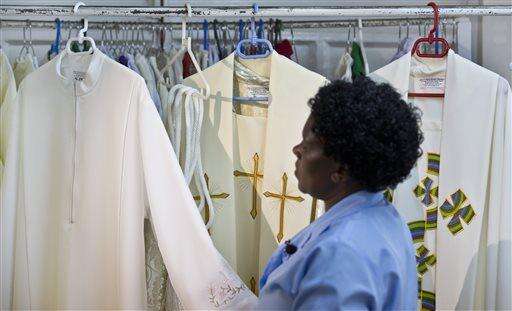
In this photo taken Tuesday, Nov. 17, 2015, supervisor Mary Njue, 50, displays three robes made for Pope Francis to wear during his upcoming visit to Kenya, sewn by the Dolly Craft Sewing Project and Women's Group in the Kangemi slum of Nairobi, Kenya. Pope Francis follows his predecessors next week, Nov. 25-30 to visit Africa whose growing numbers of Catholics are seen as a bulwark for a church seeking to broaden its appeal amid secularism, competing Christian faiths and violent extremism, in a trip that will take him to Kenya, Uganda and the Central African Republic. (AP Photo/Ben Curtis)
The Associated Press
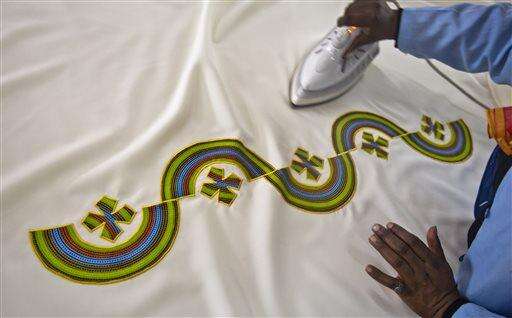
In this photo taken Tuesday, Nov. 17, 2015, Alice Ngundi, 45, irons one of three robes made for Pope Francis to wear during his upcoming visit to Kenya, sewn by the Dolly Craft Sewing Project and Women's Group in the Kangemi slum of Nairobi, Kenya. Pope Francis follows his predecessors next week, Nov. 25-30 to visit Africa whose growing numbers of Catholics are seen as a bulwark for a church seeking to broaden its appeal amid secularism, competing Christian faiths and violent extremism, in a trip that will take him to Kenya, Uganda and the Central African Republic. (AP Photo/Ben Curtis)
The Associated Press
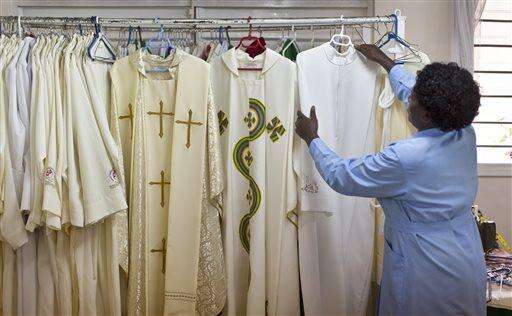
In this photo taken Tuesday, Nov. 17, 2015, supervisor Mary Njue, 50, displays three robes made for Pope Francis to wear during his upcoming visit to Kenya, sewn by the Dolly Craft Sewing Project and Women's Group in the Kangemi slum of Nairobi, Kenya. Pope Francis follows his predecessors next week, Nov. 25-30 to visit Africa whose growing numbers of Catholics are seen as a bulwark for a church seeking to broaden its appeal amid secularism, competing Christian faiths and violent extremism, in a trip that will take him to Kenya, Uganda and the Central African Republic. (AP Photo/Ben Curtis)
The Associated Press
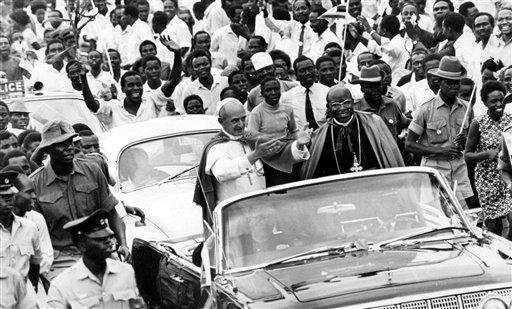
FILE - In this July 31, 1969 file photo, Pope Paul VI standing in an open car waves to the crowd jamming the road to welcome him to Africa, accompanied by Archbishop of Kampala Emmanuel Kiwanuka Nsubuga, right, in Kampala, Uganda. Pope Francis follows his predecessors next week Nov. 25-30, 2015 to visit Africa whose growing numbers of Catholics are seen as a bulwark for a church seeking to broaden its appeal amid secularism, competing Christian faiths and violent extremism, in a trip that will take him to Kenya, Uganda and the Central African Republic. (AP Photo, File)
The Associated Press
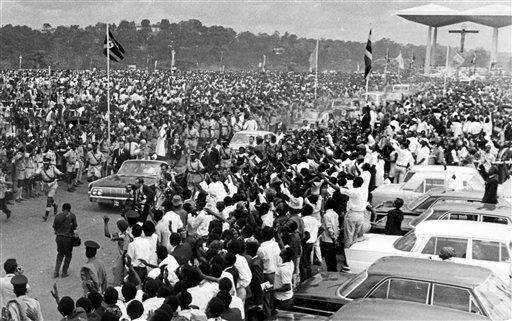
FILE - In this Aug. 1, 1969 file photo, a huge crowd waves and cheers to greet Pope Paul VI as the 71-year-old Pontiff drives away from Kololo Hill Terrace after mass in Kampala, Uganda. Pope Francis follows his predecessors next week Nov. 25-30, 2015 to visit Africa whose growing numbers of Catholics are seen as a bulwark for a church seeking to broaden its appeal amid secularism, competing Christian faiths and violent extremism, in a trip that will take him to Kenya, Uganda and the Central African Republic. (AP Photo, File)
The Associated Press
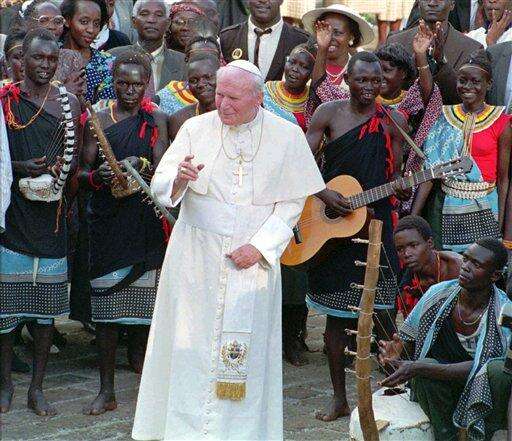
FILE - In this Tuesday, Sept. 19, 1995 file photo, Pope John Paul II is serenaded by traditionally-dressed musicians as he watches dancers perform upon his arrival to Resurrection Church in the outskirts of Nairobi, Kenya, to meet with bishops representing the countries of the Episcopal Conference of Eastern Africa. Pope Francis follows his predecessors next week Nov. 25-30, 2015 to visit Africa whose growing numbers of Catholics are seen as a bulwark for a church seeking to broaden its appeal amid secularism, competing Christian faiths and violent extremism, in a trip that will take him to Kenya, Uganda and the Central African Republic. (AP Photo/Ricardo Mazalan, File)
The Associated Press
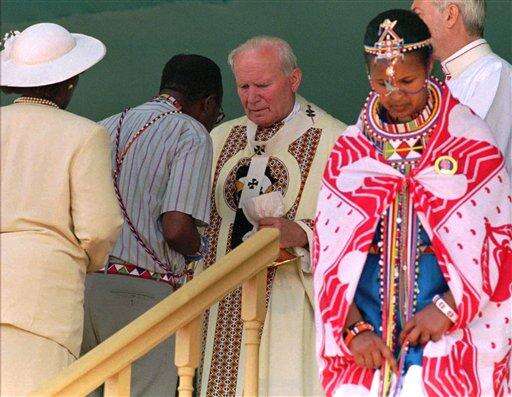
FILE - In this Tuesday, Sept. 19, 1995 file photo, a Maasai tribeswoman descends the staircase after receiving communion from Pope John Paul II during an outdoor mass in a park in Nairobi, Kenya. Pope Francis follows his predecessors next week Nov. 25-30, 2015 to visit Africa whose growing numbers of Catholics are seen as a bulwark for a church seeking to broaden its appeal amid secularism, competing Christian faiths and violent extremism, in a trip that will take him to Kenya, Uganda and the Central African Republic. (AP Photo/David Guttenfelder, File)
The Associated Press
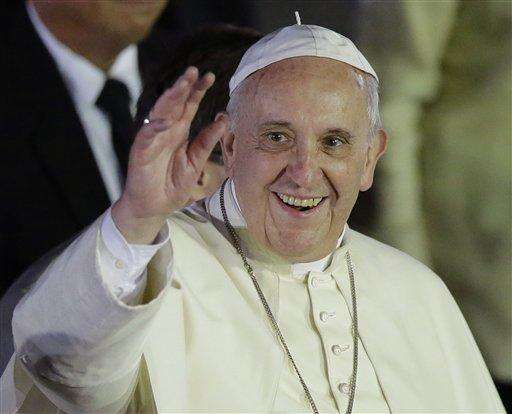
FILE - In this Thursday, Jan. 15, 2015 file photo, Pope Francis waves to well-wishers upon his arrival from Sri Lanka at Pasay city, south of Manila, Philippines. Pope Francis follows his predecessors next week Nov. 25-30, 2015 to visit Africa whose growing numbers of Catholics are seen as a bulwark for a church seeking to broaden its appeal amid secularism, competing Christian faiths and violent extremism, in a trip that will take him to Kenya, Uganda and the Central African Republic. (AP Photo/Bullit Marquez, File)
The Associated Press
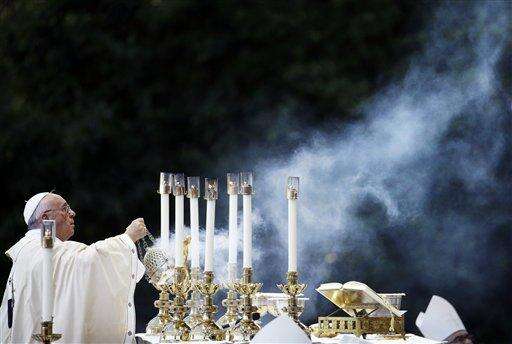
FILE - In this Wednesday, Sept. 23, 2015 file photo, Pope Francis conducts Mass outside the Basilica of the National Shrine of the Immaculate Conception, in Washington. Pope Francis follows his predecessors next week Nov. 25-30, 2015 to visit Africa whose growing numbers of Catholics are seen as a bulwark for a church seeking to broaden its appeal amid secularism, competing Christian faiths and violent extremism, in a trip that will take him to Kenya, Uganda and the Central African Republic. (AP Photo/David Goldman, File)
The Associated Press
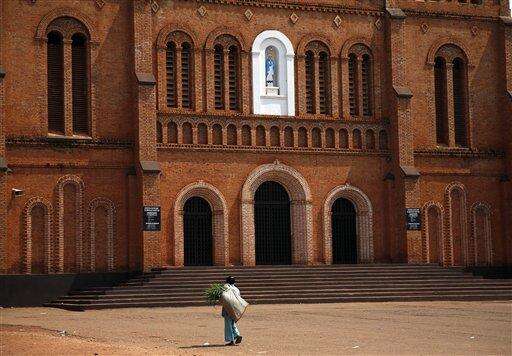
FILE - In this Thursday, Dec. 5, 2013 file photo, a woman walks past the Notre Dame Cathedral of the Immaculate Conception in Bangui, Central African Republic. Pope Francis follows his predecessors next week Nov. 25-30, 2015 to visit Africa whose growing numbers of Catholics are seen as a bulwark for a church seeking to broaden its appeal amid secularism, competing Christian faiths and violent extremism, in a trip that will take him to Kenya, Uganda and the Central African Republic. (AP Photo/Jerome Delay, File)
The Associated Press
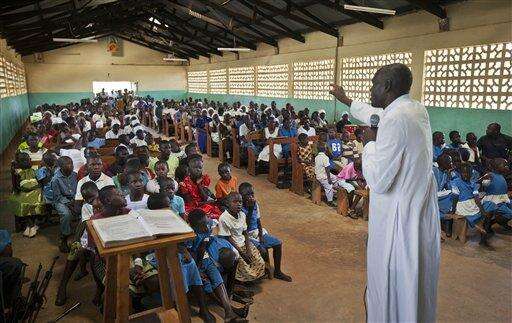
FILE - In this Sunday, Nov. 4, 2012 file photo, members of the congregation listen as Catechist Joseph Okuku, right, invites them to pray for President Barack Obama to be successful in his bid for re-election, during a service at the St. Richard Catholic Church in Kogelo, western Kenya. Pope Francis follows his predecessors next week Nov. 25-30, 2015 to visit Africa whose growing numbers of Catholics are seen as a bulwark for a church seeking to broaden its appeal amid secularism, competing Christian faiths and violent extremism, in a trip that will take him to Kenya, Uganda and the Central African Republic. (AP Photo/Ben Curtis, File)
The Associated Press
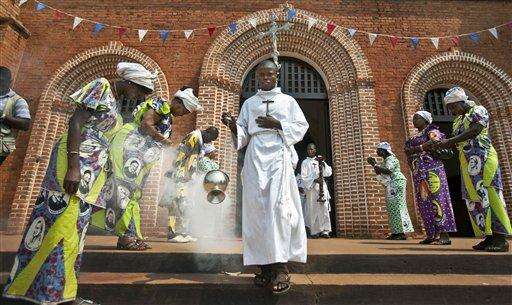
FILE - In this Sunday, Jan. 6, 2013 file photo, the thurifer swings the thurible of incense as he leads the procession out of the Notre Dame Cathedral of the Immaculate Conception at the end of the morning mass in Bangui, Central African Republic. Pope Francis follows his predecessors next week Nov. 25-30, 2015 to visit Africa whose growing numbers of Catholics are seen as a bulwark for a church seeking to broaden its appeal amid secularism, competing Christian faiths and violent extremism, in a trip that will take him to Kenya, Uganda and the Central African Republic. (AP Photo/Ben Curtis, File)
The Associated Press
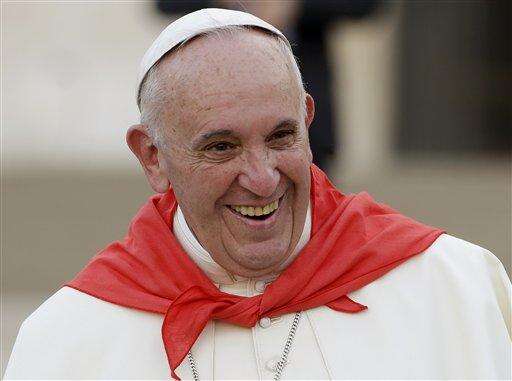
FILE - In this Tuesday, Aug. 4, 2015 file photo, Pope Francis, wearing a red scarf, has a light moment as he leaves St. Peter's Square at the Vatican after an audience with with altar boys and girls. Pope Francis follows his predecessors next week Nov. 25-30, 2015 to visit Africa whose growing numbers of Catholics are seen as a bulwark for a church seeking to broaden its appeal amid secularism, competing Christian faiths and violent extremism, in a trip that will take him to Kenya, Uganda and the Central African Republic. (AP Photo/Gregorio Borgia, File)
The Associated Press